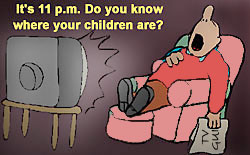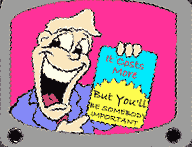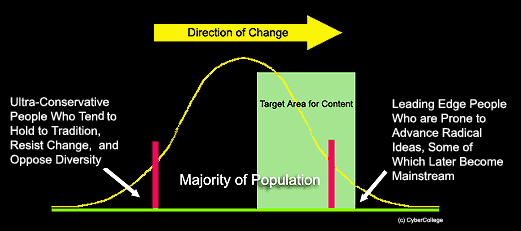Film, Radio and TV - 32 |
|
The Social Impact Part III
In this module we'll cover three more criticisms of television, starting with... 3. Encourages escapism Some people maintain that television has become the "opiate of the people" (opiate from opium, a mind numbing narcotic). We noted in Module 30 that we all need to take some time to relax and escape from the responsibilities of the day. But we quickly create problems for ourselves when we use anything--alcohol, drugs, constant socializing, TV, etc.--to as a way of escaping our personal responsibilities.
|
A stereotypical male in this category comes home from work, Although we assume not too many people completely fit this description, the shades of truth it suggests undoubtedly explains why so many people are overweight--and it might go a long way toward explaining why so many children get into trouble, due to a lack of parental attention, concern and guidance. Is television the opiate of the people? For some people
at least, it may well be. (As we've 4. Engages in economic exploitation In the United States, commercial television is a moneymaking business--it makes money by getting viewers to spend money on advertised products. Program popularity is critical, because it means that more people will watch the commercials, and, as a result, more products will be sold. In a sense, TV programs are basically a means to get people to watch commercials. This isn't all bad. The United States has one of the most vigorous and successful economies in the world, due largely to the power of advertising. This drives competition, which, in turn, keeps prices low, and boosts quality and innovation. At the same time, in order to sell products, needs often have to be created in people's minds. For example, is "static cling" in your clothes really a major issue? Are a few streaks in glasses that come out of the dishwasher really going to lower your status with your in-laws or your family? In fact, are many of these "problems" really significant problems at all, or are they largely invented to sell products? Advertising is designed to generate a need to buy certain brand-name products, which may be more expensive than lesser-known brands, while not being significantly better. Let's look at some examples of how advertising has been successful--to the extreme. Not too long ago a young boy in the United States was killed for his famous-name tennis shoes; tennis shoes that his mother had scrubbed floors to pay for. Manufacturers of less prestigious tennis shoes cost a fraction of the $100.00+ that she paid for her son's tennis shoes, and would have probably been about as good. But, in her son's mind he had to have this particular (widely advertised) brand of tennis shoes because of status attached to them--status that in the minds of other boys was important enough to kill for. In one third-world country families are known to skimp on food and other life necessities in order to buy the brand name jeans and tennis shoes they see advertised on television. These imported brand-name products, of course, are far more expensive than brands made right in their own country. In the United States, thousands of people have "maxed out" their credit cards and are struggling each month to simply pay the interest on their accounts. How much of this is due to purchasing things that are "nice, but not necessary." How much is due to being coerced into buying expensive brand names when carefully selected products with lesser-known names would probably serve just as well? These are extreme examples. Even so, haven't we all to some degree fallen victim to judging people by the kinds of things they own? Don't we just assume that people who drive expensive cars and wear brand-name clothes are somehow more important or maybe even superior to people who drive economy cars and buy their clothes at discount stores? Using advertising to try to convince us that our personal worth and status are dependent on owing the "right things" and maintaining the right image (including being slim, trim and beautiful), is, in the minds of the critics, economic exploitation.
5. Exhibits a liberal bias One rogue has defined a biased person as "anyone who doesn't agree with me." There's a lot of truth in that. Conservatives feel the media have a liberal bias; liberals feel the media have a conservative bias. If we look at the moguls who control the media we would have to concede that almost to a man (and most are men) they are all basically conservatives--some even ultraconservative. So how did the media get the liberal image? Generally speaking--and there many exceptions--people in business tend to be conservative, and people who have a background in the social sciences--through education or working with people--tend to be more liberal. The latter group includes many news people and actors, and some writers and artists--people whose ideas often surface in the media. Their views also tend to push the envelope of social change. From the standpoint of many conservatives, TV news tends to be liberal, in part because it features stories on homosexuality, civil rights abuses, antiwar demonstrations, women's rights, etc.--things associated with liberals. Plus, they feel it emphasizes the liberal point of view. From the standpoint of liberals, television is conservative because it's seen as being pro-business, and because it does not give adequate time to alternative, non-mainstream views--or, in other words, their views. So, if we can keep speaking in generalities, we seem to have a split between the basically conservative philosophies held by business-minded managers and media owners, and the more liberal people who shape the messages. How do the two factions coexist; after all it's management that ultimately "calls the shots?" Simply put, management is geared toward whatever generates profits. We've already noted that most media consumers like ideas that a slightly ahead of the status quo as shown by the green area in the normal curve represented below. (You'll recall that we discussed this diagram in some detail in Module 7.) Even the most conservative media owners, CEOs, directors, etc. regularly use sex and semi-nudity--which are not exactly associated with mainstream conservatism--to enhance profits. Although liberal-conservative arguments fill books, it would seem that the basic issues discussed here are worth considering when it comes to claims of a "liberal bias" in the media. Additional information on the liberal-conservative bias issue, especially as it applies to news (a topic we'll cover in more detail later), can be In the next module we'll conclude our discussion of the seven basic criticisms of television. |
To next module
To index © 1996 - 2005, All Rights Reserved.
|

 grabs a beer out of the refrigerator, throws a TV dinner in the microwave, crashes on the couch, and watches TV until 11 o'clock when the news comes on and threatens to invade his fantasy world. He resents any interruption. Problems at work or with family members are ignored.
grabs a beer out of the refrigerator, throws a TV dinner in the microwave, crashes on the couch, and watches TV until 11 o'clock when the news comes on and threatens to invade his fantasy world. He resents any interruption. Problems at work or with family members are ignored. noted,"opiate,"
comes form the word "opium," which is a drug with strong narcotic
properties.)
noted,"opiate,"
comes form the word "opium," which is a drug with strong narcotic
properties.)
